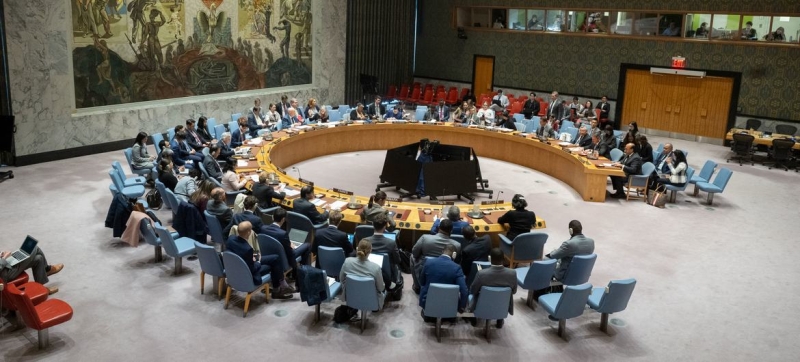
Security Council meeting. Conflict in Sudan: UN warns of widespread violations and calls for immediate cessation of hostilities Peace and security
The situation in Sudan continues to deteriorate rapidly, Martha Poby, Assistant Secretary-General for African Affairs, said at the Security Council. She spoke in particular about new outbreaks of violence in the country.
After more than 500 days of siege, the city of El Fasher in North Darfur was captured by the Rapid Reaction Force. Only isolated pockets of resistance remained. This event, Poby noted, was a turning point that changed the balance of power in the region.
Fierce fighting and drone attacks
Other parts of the country are also suffering from continuous fighting. Clashes have intensified in recent weeks in the Kordofan region, which the UN says could become a new scene of heavy fighting. Last week, the Rapid Reaction Force captured the town of Bara in Northern Kordofan, just 40 kilometers from the state capital of El Obeida. Both sides are actively using drones, expanding the geography of the conflict. Strikes are carried out in the territories of Blue Nile, Khartoum, Sennar, South and Western Kordofan. After the re-opening of Khartoum airport was announced, it immediately became the target of massive drone attacks. “The consequences of drone attacks are obvious – increasing numbers of civilian casualties, increasing humanitarian needs and further destruction of infrastructure,” – stressed she.
Mass crimes
The UN records signs of mass crimes, ethnic violence and violations of international humanitarian law, including sexual violence. In El Fasher, according to the Office of the United Nations High Commissioner for Human Rights (OHCHR), there have been mass killings, executions and attacks on civilians trying to leave the city over the past week. Communications with El Fasher have been cut off and the exact death toll is unknown. Despite the parties’ stated intention to protect civilians, the civilian population of El Fasher is in danger, and there are no safe escape routes. There are also reports of massacres in the city of Bara, where, according to the UN, at least 50 people were killed, including five Red Volunteers Crescent, allegedly executed without trial. The UN will continue to seek to bring those responsible to justice. Poby recalled the recent extension of the mandate of the UN Fact-Finding Mission and the verdict of the International Criminal Court in the case of Ali Muhammad Ali Abd-al-Rahman (known as Ali Kushayb).
End the conflict
The UN Secretary-General again called on the parties to immediately cease hostilities and return to negotiations. “The time has come to take the first step towards lasting peace for the Sudanese people,” Pobi said. She also stressed that any outside intervention in the conflict must stop, since the flow of weapons and mercenaries only fuels the war. According to her, the Secretary General’s personal envoy for Sudan, Ramtan Lamamra, invited the parties separately to enter into negotiations with the UN, focused on de-escalation and the protection of civilians. Both sides have expressed their willingness to participate in this process, and the UN is counting on the support of states that have influence over them. Pobi reported that within the framework of the Quartet mechanism (African Union, Intergovernmental Organization on Development, League of Arab States and the UN) an intra-Sudanese dialogue is being prepared under the auspices of the African Union. Consultations are underway with key Sudanese actors on the timing and role of international organizations. She added that coordination of international efforts is critical. The UN and the African Union are planning a ministerial meeting in Addis Ababa to agree on mediation efforts and set priorities. Concluding her remarks, Pobee called on the Security Council to be decisive: “We must play our part to end this devastating war. We must stand with the people of Sudan, who have suffered for too long.”
Security Council Statement
The members of the Security Council today issued a statement reaffirming their commitment to the sovereignty, independence, unity and territorial integrity of Sudan and called on all states to support efforts to achieve peace. “In this regard, the Security Council reaffirmed its opposition to the creation of a parallel authority in the territories controlled by the Rapid Reaction Force,” it said statement.
Humanitarian catastrophe
According to UN Under-Secretary-General for Humanitarian Affairs Tom Fletcher, the humanitarian catastrophe in Sudan is getting worse. He said that El Fasher, already a symbol of suffering, “sank into an even darker hell” after the Rapid Action Force entered the city and began carrying out mass executions. Fletcher stressed that what happened was not a surprise: the international community knew about the impending disaster. According to the UN, almost 500 people – patients and their relatives – were killed in the hospital of the Saudi Maternity Center. It was just one of numerous attacks on health facilities that Fletcher said was “yet another example of how brutally this war is being fought.” In recent weeks alone, tens of thousands of people have fled their homes to escape the violence. Most of the refugees women, children and elderly – walk towards the city of Tawila, which is already overcrowded. Those who try to leave face extortion, violence and the risk of being killed along the way. Despite persistent threats and restrictions, humanitarian organizations working in Sudan provided assistance to 13.5 million people between January and August. UN and international NGO teams continue to provide emergency medical assistance, treat children for malnutrition, distribute food and fight cholera outbreaks. Fletcher announced an additional $20 million from the Central Emergency Response Fund to scale up assistance in Darfur and Kordofan. These funds complement funding from the Sudan Humanitarian Fund to support local partners working in affected areas. Fletcher concluded his remarks by noting that the crisis in Sudan is a failure of civilian protection and international law: “We hear no screams, but as we sit here, the nightmare continues.
